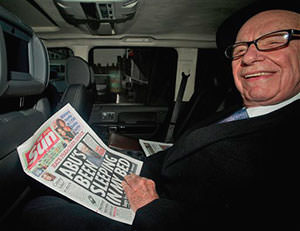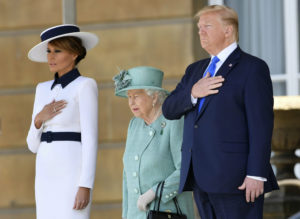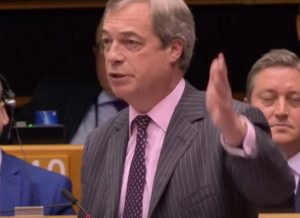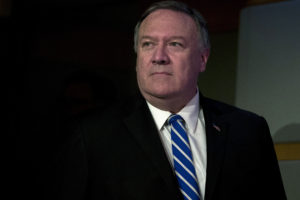Rupert Murdoch Seeks to Add to His Empire
The recent Leveson Report on the British hacking scandal shows the danger of the media baron adding to his already vast American holdings.
The recent Leveson Report on the British newspaper hacking scandal shows the danger of media baron Rupert Murdoch buying the Los Angeles Times and Chicago Tribune.
The Los Angeles Times reported in October that executives of Murdoch’s company, News Corp., have had preliminary talks with the new owners of the Tribune Co., which is emerging from bankruptcy. The battered Tribune Co. owns the Chicago Tribune and the L.A. Times.
The papers would add greatly to Murdoch’s U.S. media holdings, which already are astounding, as a 2011 compilation by the Columbia Journalism Review showed. The properties range from the powerful Fox News Channel, the Wall Street Journal and New York Post down to the Stockton Record, which serves a small, struggling city in California’s agricultural Central Valley. Add to that the film studio 20th Century Fox, popular cable networks including FX and Fox Sports, publishing house HarperCollins and television stations throughout the country, and you have the nation’s most powerful media mogul.
A News Corp. representative said the Times story was “wholly inaccurate.” But it’s difficult to believe anything News Corp. or Murdoch says after reading the report by Lord Justice Sir Brian Leveson, released last month. Prime Minister David Cameron gave Leveson the job in response to public outrage after an exposé in The Guardian newspaper. The paper told how the News Corp. paper News of the World intercepted voice-mail messages to the cellphone of Milly Dowler, a missing teenager who was later found dead. That led to continued investigation, which uncovered more hacking and bribery of public officials by the News of the World and its sister Murdoch tabloid, The Sun. Murdoch closed News of the World as the scandal grew.
In his report, Leveson explains how News of the World operated with outright defiance of police investigating the hacking. He quotes from an account of Detective Chief Superintendent Keith Surtees who described how police tried to search the offices of News International, the Murdoch entity that published News of the World. Surtees described the obstacles the company put up to stop police officers.
“There was some real difficulty in conducting the search at News International,” Surtees said. “There were, I think, four of my officers who actually got into the premises before News International barred the rest of my officers. …” The police seized some material from the reporter’s desk but were “confronted with photographers … and they were taking pictures of the officers. A number of night or news editors challenged the officers around the illegality of their entry … it was described to me as a tense standoff. … Our officers were effectively surrounded and photographed and not assisted in any way, shape or form.”
I suppose some might regard the News International action as a heroic defense of press freedom. But remember what they were fighting for –bribery, hacking, complete disregard for individuals’ rights or privacy — except those of their rogue reporters and management.
As Leveson wrote, it “points to a serious failure of governance within News of the World, News International and News Corporation.” He said, “An organizational culture that is founded on integrity and honesty would require not only full co-operation with law enforcement, but also a determination to expose behavior that failed to comply with the law. That would normally be achieved through a thorough internal investigation of any allegation. … What happened at the News of the World in relation to voicemail interception in this context is particularly informative about the culture that pertained both within the corporate and editorial operations.”
If management such as this takes control of two of the most important institutions in Chicago and Los Angeles, it’s bad news for those cities and, considering how it would strengthen Murdoch’s nationwide reach, for the rest of the country.
In addition, as L.A. Times former media critic Tim Rutten has pointed out, acquiring the Times would give News Corp. power over the paper’s coverage of the entertainment business, including the 20th Century Fox movie and television enterprises Murdoch owns. That’s a conflict of interest that stretches even the loose standards of a business famous for conflicts of interest.
A Murdoch L.A. Times could wield its power in the same way Fox News shapes its coverage in favor of the Republican Party. Fox movies might be praised and promoted just as old-time newspapers and gossip columnists in the studio bosses’ pockets used to tout every dog from the big studios.
Worse yet, Murdoch would have disproportionate control of local news in Chicago and Los Angeles as well as in surrounding metropolitan areas. Murdoch owns two television stations in Chicago and two in Los Angeles. With the newspapers and television stations, Murdoch and his editors could call the shots in both cities. His defenders point to the Wall Street Journal, whose news coverage has remained fairly straight under the Murdoch reign. But he had to do that to keep the large number of Journal subscribers who rely on it for hard business and economic news.
Two factors stand between Murdoch and his possible moves to Los Angeles and Chicago. One is economic. The fiscal condition of News Corp. and Murdoch may decide whether he wants to spend money in the declining newspaper business. News Corp. is shutting down its digital publication, the Daily, but the L.A. Times reported the company has “more than $10 billion in cash and has begun a buying spree. …” The other is legal. Federal Communications Commission rules forbid one company from owning a newspaper and a television station in a single community, although the Tribune Co. was granted a waiver to do just that in Los Angeles.
It’s a bad idea that could become permanent. The magazine Broadcasting & Cable reported that the head of the FCC is circulating a proposal among commission members that would allow a single owner of both newspapers and television stations in the nation’s top 20 markets.
This would open Chicago and Los Angeles to Murdoch. The proposal should be dropped.
The media entrepreneur insisted his hands were clean in the hacking scandal. But as Leveson said in his report, the culture of an organization is established at the top. Such a man and organization shouldn’t be given near-monopoly power in two of America’s biggest cities.
Your support matters…Independent journalism is under threat and overshadowed by heavily funded mainstream media.
You can help level the playing field. Become a member.
Your tax-deductible contribution keeps us digging beneath the headlines to give you thought-provoking, investigative reporting and analysis that unearths what's really happening- without compromise.
Give today to support our courageous, independent journalists.







You need to be a supporter to comment.
There are currently no responses to this article.
Be the first to respond.